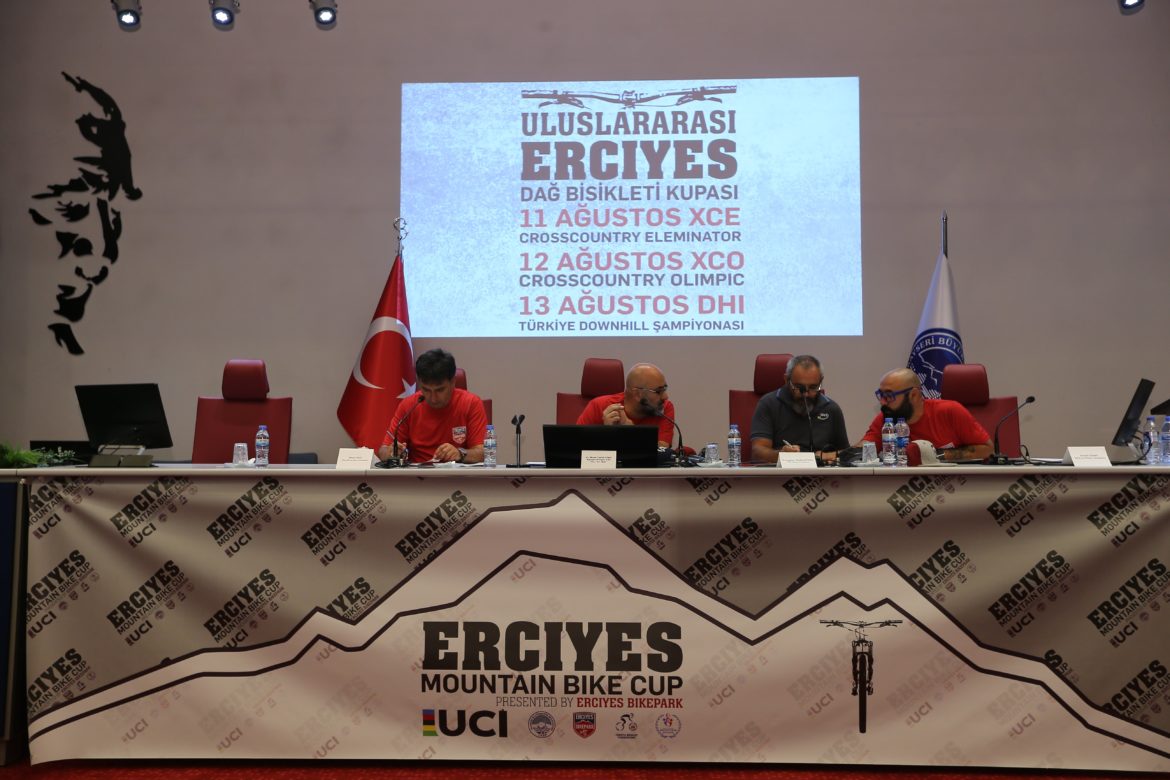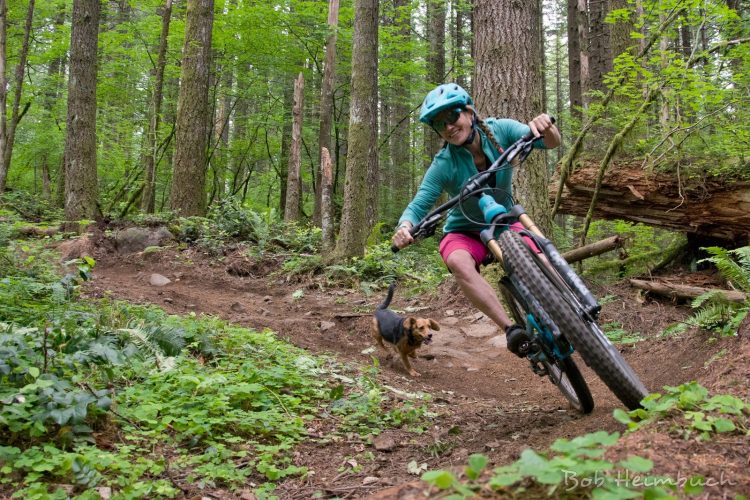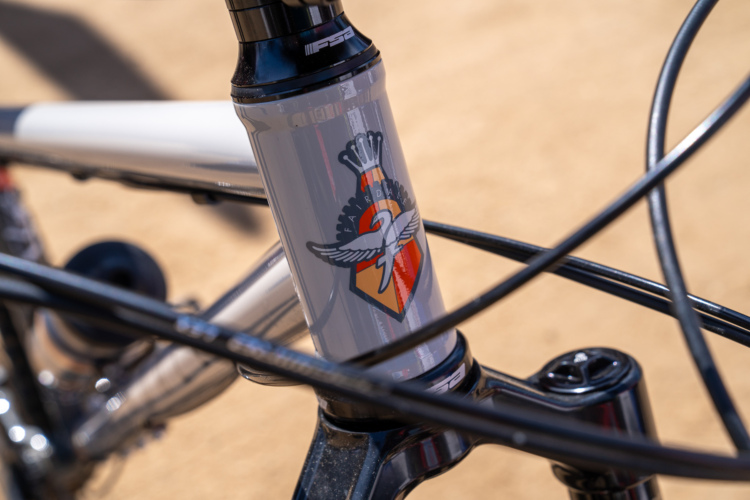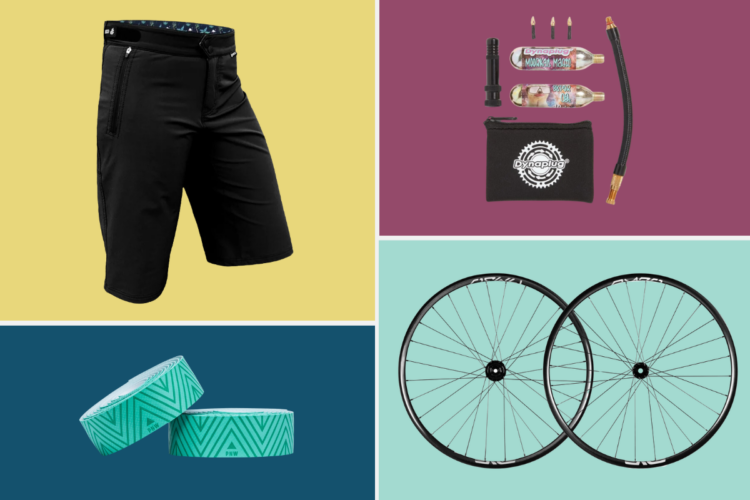
Mountain biking has an origin story in every country. In the US that story involves folks ripping fire-roads on mod-cruisers in Marin County, California. Or, it may have begun with a gaggle of country kids jumping grandma’s mixtie off a fortified plywood ramp in the middle of the family farm. The truth depends on who you ask. If you share the Marin story in a large enough group of riders there will often be at least one who refutes it with a version of their own.
In the continent-straddling Republic of Turkey, mountain biking is just finding its dusty feet and has a fiercely passionate advocate in Emrah Özbay to champion its future. I caught up with Emrah at Eurobike last month and had a chance to chat about what he is doing to secure the future of shredding in his home country.
How did you first get started mountain biking?
I was both studying and working. It was financially pretty challenging to study at university, especially at a fine arts facility. I was organizing university events and working on movies and TV series for them. My university didn’t pay me in my last year of school. Later they were forced to pay me high amounts of money. I suppose I got lucky.
Since I wasn’t so in need of money back then, I started to think what I should do with the money and came by the idea of buying a simple mountain bike. In just two weeks, I realized that this simple mountain bike wasn’t going to be enough for me. I found a second-hand Specialized Demo-8 for sale from some English mountain biker who lives in Turkey and I bought it. I suppose the money that my university owed me was the thing that started a new age of mountain biking in my country.
How did you learn to ride? Did you have to build new trails to get started? Did you have a mentor?
At first, I didn’t know what to do for real and I was just trying to ride down the mountains near the place where I live. Since I had no mentor to teach me, it wasn’t easy to Improve myself. By chance, I found a group of amateur mountain bikers that were building their own bike track in my city. After I spent some time with them I moved to Istanbul and met another group of mountain bikers who had joined local XC races and were doing downhill and freeride for fun.
At that point, I realized there wasn’t a race in categories like Downhill, Freeride or Dirtjump and that those local groups were very disconnected from each other.
Then I organized Turkey’s first downhill races called “Prime Downmall “ by getting sponsorship from shopping malls. I got information about how to build ramps from biking groups abroad. Since I was familiar with wood and metalworks I made my own ramps for indoor races. I guess 2012 was the year that changed people’s view of downhill in my country. In the following years I had to call an end to Downmall series because I started to build tracks at the ski resort.
[see_also id=’55584′]

Tell me about your job on the mountain, running the race and building trails, and things you do in your job with the Turkish government.
Those mall events caught the interests of many people and companies of all kinds. After some time a few companies wanted my support for making XC tracks. Meanwhile, we made a Freestyle Motocross show with a Polish company called Radical. I learned a lot from Radical’s owner Karol and his close friend Piotrek. Those lessons took my riding and ramp building knowledge to another level.
While I was working with those organizations, a local TV channel from Turkey became interested in making a TV show and we shot a 13 episode documentary mountain bike show. Just after the show aired, managers of Erciyes Ski Resort got in touch with me through organizations that I worked with in the past and said that they wanted to make a bike park.
In 2015 we started to meet. After a long time of planning, mapping, and local inspections we started building in the middle of 2016. I suppose it was the year that downhill sport got officially started in Turkey. Then, with the ski resort’s financial support, I invited Karol, Piotrek, Pavel Alekhin and their team to improve and advertise our bike park. Then came riders like Mark Matthews and Mason Mashon. I realized that I can improve myself with each experience and the Erciyes Bike Park, where I still work, it is always underneath my feet.

Can you share a little about your overall race career? Have you raced other types of MTB besides enduro? Can you share some race highlights or wins?
You already know that there aren’t many races in my country, but when I was making “Downmall” Series I was also participating in those races after building and organizing them. In those races, I got 3rd place in first season and 2nd place in the second season. Other than that, Downhill Olympus enduro races were started at the time with the participation of over 100 mountain bikers and I got my share of finishing in the top 10. Next year the organizing company decided to have me as a director, and thus I wasn’t able to participate in races anymore.
Tell me about all the teams you are working with, in terms of training and your work with the Turkish Olympic XC team.
After some time building bike tracks and organizing races in Turkey, I got the interest of the Turkish Cycling Federation and they picked me to be on the Mountain Biking Technical Committee. As a country, we are far behind other countries when it comes to mountain biking and we will be for a little while. Since being elected to the committee I have seen a lot of improvements, and expect a lot more.
Our national mountain biking team was training under poor circumstances or traveling to [other] countries in the Balkan states in order to train. I realized this after joining the committee and I quickly built a training track in Erciyes Bike Park, with ramps, stone gardens, and other things. This year our National Mountain Biking Team and national team candidates will be training in a track like they never had before. The Federation’s desire to found an Olympic XC team was going to be pretty hard without race tracks and education systems based on global standards, but I suppose now we have somewhere to start from.

What is the future of mountain biking in Turkey? Do you see it growing into a larger outdoor sport? Is the government supportive of the sport?
Seven years ago, when I got my first bike, there were less downhill and enduro bikes than fingers of a hand in Turkey. In the following years, I saw that there were around 100 people participating in local mountain bike races. Now when I look at the statistics of Erciyes Bike Park, I see that every weekend 20-30 mountain bikers from local areas or other cities come here to ride.
In every corner of Turkey, kids below 18 are building small ramps and jumping from those ramps with simple mountain bikes that their parents bought them. Instagram and Facebook allow those children to get in touch with us, and I suppose social media is one of the most effective ways to share biking in this country. Of course, it’s not limited to the children, there are also people who have started mountain biking as a hobby and that community is very important to improve the sport.
For the first time, in 2016, a distributor brought Downhill and Enduro bikes in small numbers, and of course, they sold out as soon as they arrived. Now lots of companies in Turkey are bringing Downhill and Enduro bikes. People all around Turkey are getting in touch with me, I’m giving advice and doing whatever I can to help them get the products they need. I’m also training people who come to Erciyes Bike Park whenever I am free, without asking any charges.

Can you share a bit about your recent crash and recovery story?
In 2017 I was still building and developing the bike park and stopped joining the races since it wasn’t ethical to participate in races that took place on a race track I build. I built a drop that was going to be used the next year. On a day when the weather was not very pleasant and it was rainy, I was out there to test the drop. If you were going 20-25 kph, and let your bike flow around those speeds, you were able to land smoothly. The forest was wet and it was windy and I can’t remember it all, though I was going faster than I should have been.
I crashed and had memory loss issues for 3 to 4 months after. I remember some shards just after my crash like I’m being carried to the ambulance, and the time just before they took me to surgery. I had a fractured kneecap, fractured skull, broke my nose in several places, and a broken arm in 12 places. After plenty of time, they were able to put my arm together. It took 2 years for me to have a decent grip on handlebar again. Four surgeries in two years, where they put metal pieces in my arm, took them out, added carbon fiber, rebuilt my kneecap. I spent a lot of time in the hospital during those 2 years.
After all of that, even though there wasn’t much that I had built and accomplished in my life, we decided to shoot a documentary about it. The doc is about what I have done so far with mountain biking in Turkey. My hope is to send it to mountain bike documentary festivals in the spring of 2019, and also to publish it on television in Istanbul subways. We are working as hard as we can to reach and inspire more people. I’m hoping that the things we have done so far have a value. It’s hard to describe what an honor it is to do this work, I suppose. For now, we don’t have a place in the global arena, but I believe we will have it someday.

Please share any interesting details that relate to you, or Turkey, and mountain biking.
My country’s economy is highly affected by the global economy. As I’m giving
this interview, 1 Euro is equal to 5.6 Turkish Liras. In this country, a lot of kids and
teenagers need equipment and bikes to start this sport at their young age. To get those
they are saving money from their pocket change, but economic obstacles are not
letting them get what they need. At the moment a bike with a €2,000 price tag
is 11,200 Turkish Liras. That is 6.3 times more than the minimum wage of
a family. We can’t force companies to do anything, but global companies should make
bikes with low budget components to make mountain biking a more global and
affordable sport in countries like Turkey. As I said we can’t force anyone to do that
but it is necessary in order to create even competition and to include ambitious people from everywhere to this sport.
I’m hoping that the downhill adventure that I got into in 2012 will spread all over the world in my lifetime. I thank you for this interview and for your precious time. Turkey is a magnificent location for all kinds of biking, including mountain biking. Riders from around the world are coming here, helping to improve the sport in a very good way. I hope that everyone who reads this will add Erciyes Bike Park and Cappadocia to their list of places to travel.

So there you have it, the blossoming buds of mountain biking in Turkey. Or did it begin with the few folks who were racing XC before Emrah showed up? Or with some British guy who brought a Specialized DH bike to Turkey? Likely it depends on who you ask.
Regardless of the name on the plaque, mountain biking is spreading through the impassioned efforts of folks like Emrah. As he and his posse continue to improve trail access and race opportunities in their country, mountain biking as a sport has more ways to grow, change, and diversify.



















